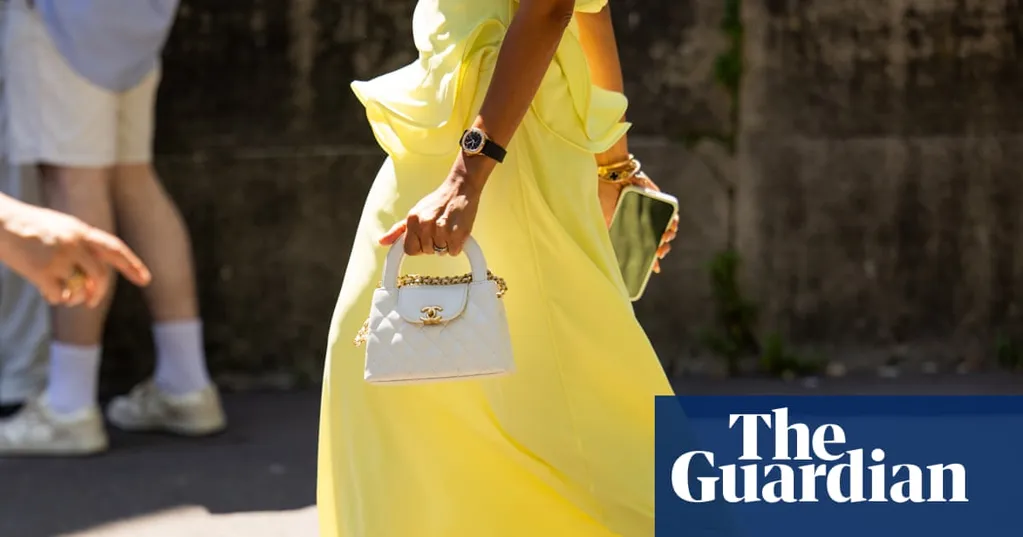Police say ease of re-selling, twinned with growing demand, has encouraged gangs to target luxury leather goods.
A series of million euro robberies of luxury handbags from boutiques and brand headquarters in Paris has shown that high-value leather goods are now a bigger target for organised criminals than jewels or cash, as French police pursue sophisticated gangs targeting designer bags.
Paris has seen several high-profile robberies of handbags over the past year, fuelled by the growing global demand for designer leather goods which are increasingly being displayed by influencers on social media. As designer handbags sell for record prices at auction - with the late singer Jane Birkin's Hermès bag fetching €8.6m (£7.4m) this summer -- prices are rising in boutiques and second-hand bags are gaining value as collectors' items.
Jérôme Lalande, an expert on leather goods at the Paris appeals court, said demand for designer handbags was currently so high that the second-hand market was flourishing, making bags very easy to sell on. "There's a lot of money to be made," he said. "Handbags have come to represent social status."
Last month, the Paris showroom of Houlux, a broker of second-hand designer bags that sells by appointment only, was robbed in a dawn raid. Burglars climbed up to a fourth-floor balcony and in less than 20 minutes took more than a hundred luxury bags by brands including Hermès, Dior, Louis Vuitton and Chanel, estimated to be worth a total of €1m.
A few days later, the offices of the luxury brand Louis Vuitton in central Paris were broken into just after midnight by two masked men who broke down an inside door and took a large number of bags, reported to have been worth more than €1m.
In May, a large number of handbags were stolen from a Louis Vuitton boutique on Paris's Boulevard Saint-Germain after a car was ram-raided into the shopfront in the early hours of the morning, allowing the robbers to enter the store and clear the shelves. It was the third such ram-raid on the boutique in only nine months. In November, neighbours had filmed a car drive into the same shop in the early hours of the morning as robbers dressed in black calmly loaded up scores of luxury bags before speeding off.
Pascal Carreau, the head of the Organised Crime Unit of Paris's judicial police, said handbags were one of the last remaining high-value objects that gangs can target in Paris. "Historically, before the explosion of drugs, French criminals, and particularly Parisian criminals, carried out armed robberies of banks, which in the 1970s had almost no protection at all."
But now with banks well-secured and less cash in circulation in society, patterns have changed. He said: "The teams of criminals who have not moved on to cybercrime are looking to target physical objects of value on the market. And all that is left are jewels or luxury leather goods."
In January, an employee carrying out a stock inventory in central Paris for LVMH, the conglomerate that owns Louis Vuitton and many other luxury brands, discovered 50 handbags by the label Loewe, worth about €100,000, were missing. Examination of CCTV footage showed two suspects had entered the building one night before Christmas and exited carrying six large sacks believed to contain the bags.
Last year, a Chanel shop on Avenue Montaigne in central Paris was ram-raided by a car and robbers escaped with bags worth between €500,000 and €1m. In 2024, an influencer who specialised in luxury handbags and posted photographs of herself posing with her bags in Paris locations, saw her home targeted by thieves who stole items including bags worth between €20,000 and €30,000.
Earlier this year, Paris criminality returned to global headlines when a group of men who in 2016 robbed the US reality TV star Kim Kardashian of her jewellery, including a £3m 18.88-carat diamond engagement ring from her then husband Kanye West, were found guilty after a high-profile trial.
But Carreau said jewellery heists in Paris had dropped significantly to one or two each year because high-value jewellery pieces, which were often unique "works of art", were hard to resell on the blackmarket. He said luxury bags, on the other hand, were easier to sell on. "The resale is happening on second-hand sales sites. Some of the bags are transported abroad and sold the same way across Europe," he said.
This was fuelled by the growing trend for acquiring luxury bags spreading across different levels of society and becoming much more commonplace, Carreau said. "Forty years ago these bags were marginal; now the fashion for luxury is much more widespread."
The first six months of 2025 showed a marked drop in crime in general in Paris compared with the previous year: armed robberies were down by more than 9%, burglaries by 15% and theft of cars and motorbikes by 14%.
Carreau said that raids on expensive handbag boutiques were not a daily occurrence in Paris but they had a spectacular impact because sometimes videos by onlookers who witnessed events had circulated on social media.
Lalande, the appeals court expert, said: "A classic Chanel bag that was €5,000 in a boutique five years ago can now cost €10,000 in a boutique. So alongside those shop prices, the second-hand prices have also risen ... There is a global demand - from Beijing to Dubai, New York to Paris and London."
Lalande said bags were relatively easy to re-sell because they couldn't be traced as easily as watches or jewels.
He had seen a shift in criminals' focus on bags over the past 25 years. "Twenty years ago, I was contacted because a [Hermès] crocodile Kelly bag was stolen from a woman in Paris. The bag was later found in a bin with her wallet that had been emptied. Years ago, a bag would be stolen for its contents. Today the target is the bag itself."
